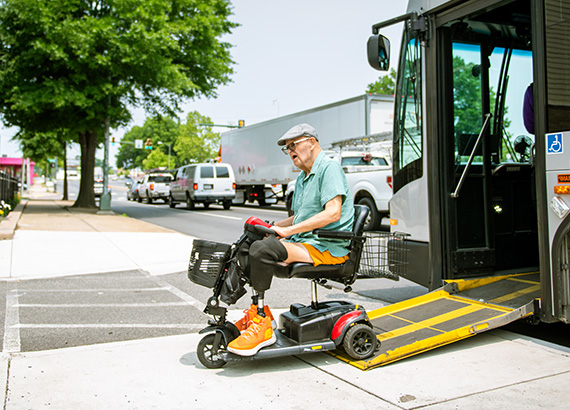Transport for elderly people with disabilities

Are you caring for an elderly loved one with a disability? It follows that a good quality of life is what you wish for them. Of course that will involve getting out and about. If so, you may need some helpful information on how to take them on outings on public transport. Here, at Vermont Aged Care, we know how important quality of life is, for able-bodied people and those with disabilities. We hope the following information will ensure many happy travels for yourself and your family.
Accessible transport
Whether your elderly loved one is suffering from a permanent physical, intellectual or mental disability, accessible transport solutions are available nowadays. Furthermore, they need stimulation, fresh air and company to remain happy and positive. They will benefit greatly from feeling part of the community at large. As will you from getting a break from the house routine and four walls.
Trains, Trams and Buses
The best place to start for information on the above is on the website of Public Transport Victoria. However, there is a lot of diverse information available. So we thought it might be helpful to break it down for you. For instance, whether your elderly relative is able to walk, in a wheelchair or using a care animal here are just some of the things available to you.
Try Before You Ride
Once a year, Victorian public transport operators offer customers the opportunity to practice on stationary vehicles. The aim is to take away the apprehension you and your elderly loved one might feel. What’s more you will learn how to board and alight trains, trams, buses fitted with ramps, low-floor vehicles and modified taxis. You can get detailed information at https://www.ptv.vic.gov.au/getting-around/accessible-transport/try-before-you-ride/. You can register online, or by calling 1800 800 007. If you wish you may register by emailing the PTV Accessibility team at transport.accessibility@ptv.vic.gov.au.
Mobility aids
You may already be aware that wheelchairs, scooters or motorised vehicles come under the general heading of mobility aids. That is why Public Transport Victoria offers advice that is specific relating to extra space, dimensions, stability and manoeuvrability. When planning your trip with your elderly loved one, knowing what to expect will make things easier. To check that their mobility aid will fit on public transport, contact the relevant operator before you travel. Check with Operator Contacts at https://www.ptv.vic.gov.au/customer-service/operator-contacts/ for more information.
Assistance dogs
Care animals are now welcome in almost every location and situation in Victoria. What’s more they can travel for free on all public transport. This includes guide or seeing eye dogs, hearing dogs as well as dogs in training.
In conclusion
Getting older or having a disability need no longer mean staying at home. With a little bit of planning and research your elderly loved one can continue to enjoy life. You can both look forward to many happy adventures together. Don’t forget to take pictures or videos to show the family on your return. From all of us here at Vermont Aged Care, happy travels and please look out for our next blog.
This link to PTV will provide lots of helpful reading
This blog is intended to provide helpful advice. Please speak with your family GP for personalised information or, for specialist advice & support in Melbourne Australia, please contact VERMONT AGED CARE

